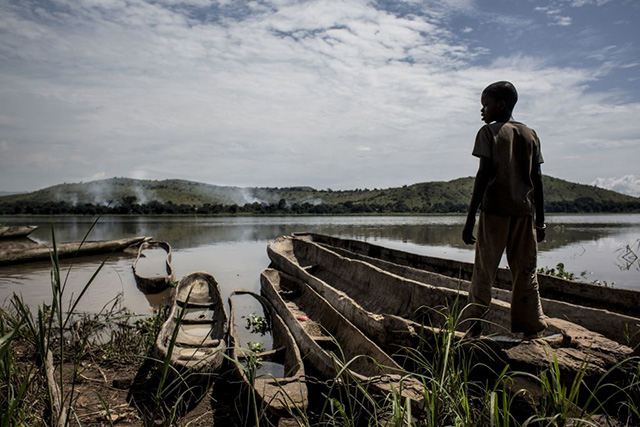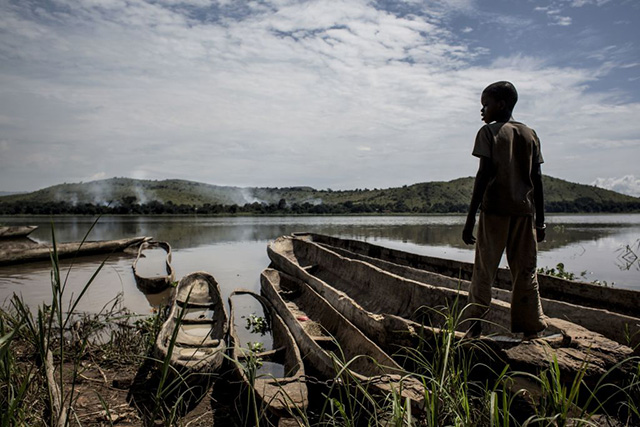
Honest, paywall-free news is rare. Please support our boldly independent journalism with a donation of any size.
 A young boy looks on from the Democratic Republic of the Congo, as smoke rises from an ongoing attack, allegedly carried out by the Seleka Militia on the village of Mobaye in Central African Republic on September 21, 2017 in Mobayi-Mbongo. (Photo: JOHN WESSELS / AFP / Getty Images)
A young boy looks on from the Democratic Republic of the Congo, as smoke rises from an ongoing attack, allegedly carried out by the Seleka Militia on the village of Mobaye in Central African Republic on September 21, 2017 in Mobayi-Mbongo. (Photo: JOHN WESSELS / AFP / Getty Images)
“Africa fed the world, but the world eats without Africa.”—Dr. E. Obiri Addo
In 1983, Audre Lorde wrote that, “among those of us who share the goals of liberation and a workable future for our children, there can be no hierarchies of oppression,” and that the act of placing oppressions on a scale of hierarchal importance is an oppressive act in itself. Of course, most on the left — particularly those in Western countries who espouse anti-imperialist, antiwar, anti-colonial politics — would agree with this in theory, but many seem to fall short of this analysis of anti-hierarchal political sentiment when it comes to the continent of Africa. There seems to be a deficit of caring — or rather, caring enough to self-educate, research and act — within the Western left on the current movements, histories and activism within African countries.
On the left in the West, we tend to critique global situations of state violence which are exacerbated and perpetuated by Western influences, and rightfully so. The left has aptly rallied against US intervention in places like Syria, where US airstrikes have already claimed thousands of civilian casualties. Western leftists have spent decades advocating for the rights and humanity of the Palestinian people against Israel’s illegal settlement of their land, and the violence it perpetuates against Palestinians. Due to its relation to an active socialist project, the inner-workings and uprisings of Venezuela have been an integral part of the left’s anti-imperialist praxis in the last year. We see the Western left prominently supporting the movements, self-determination struggles, anti-interventionisms and basic humanity of several communities in various parts of the world, and these communities certainly deserve much more support than they are currently receiving. However, when will there be room to support African struggles equally on this roster?
A few years ago, I began working closely to create political education events in Atlanta through the Walter Rodney Foundation, an organization that is headed by the family of the late Guyanese revolutionary intellectual Walter Rodney. Since then, I have watched double standards in oppressive hierarchy play out in real time, both online and in person. As an organization that works to bring radical African and Caribbean activists, academics and artists from throughout the African diaspora to Atlanta to discuss both historical and contemporary politics in Africa, many of our lectures and panels have audiences filled with Marxists, anarchists, radical feminists and womanists, and other left thinkers who come to hear Pan-African takes on current events. Each time I lecture on the violence in South Sudan, which can certainly be summarized as a conflict deftly exacerbated by the US and other outside profiteering agitators, or any other African-related topic, I watch faces in the audience fill with astonishment — this knowledge appears to be completely new to them.
The US left is nearly silent on the situation in the Democratic Republic of Congo (DRC), where violence, instability and civil war have ravaged the country for decades now. In the DRC, the UN has massively failed in its various “peacekeeping” endeavors, having worsened the violence in many instances. UN peacekeepers stand accused of over 700 cases of rape and sexual assault, but most have not been held accountable. Since 2016 alone, more than 1.3 million refugees have been displaced in the DRC due to conflicts.
The interpersonal violence and downright instability within the country can also be partially (if not mostly) blamed on American and European development institutions and multinational corporations that use what is now called “agro-colonialism” to dominate the region through corrupt land-grabbing and human rights violations. Arguably one of the world’s most mineral-rich countries with billion-dollar mining contracts that benefit mostly US, Swedish and Canadian-based companies, and include the use of hiring private militias and child slave labor for mining, the Congolese people have had their land and humanity trampled by Western forces for decades through capitalist exploitation and violence, yet few “Hands Off the Congo” campaigns have permeated the Western left’s scope of interest as similar countries, such as Venezuela, have.
Similarly, we can see this hierarchical placement of global oppressions played out in the lack of coverage, sentiment and knowledge of the war in South Sudan, the world’s “newest” country. As investigative journalist Nick Turse details in his 2016 book Next Time They’ll Come to Count the Dead: War and Survival in South Sudan, the creation of South Sudan in 2011 was a project that the US helped solidify under a bipartisan committee, following two long civil wars that stretched from 1955 to 2005 and cost over 6 million lives, bolstered by the US’s funneling of military equipment to “rebel groups” from 1996 onward. This military equipment exacerbated already-present conflicts, heightened by millions of dollars of weaponry funneled through Ethiopia, Eritrea and Uganda. Along with this, news of Hillary Clinton’s State Department issuing waivers to allow the South Sudanese military to use child soldiers, despite specific law banning nations from providing military assistance to countries that use child soldiers, should have caused an international outcry led by the US left, but sadly, it didn’t.
Today, South Sudan is on the brink of yet another civil war while US presence in the country increases, assumedly bidding for access to Sudan and South Sudan’s million-dollar oil reserves. South Sudan is one of the most armed populations in the world, with arms deals from Israel, Ukraine, Canada, Iran, Britain and China, and others fueling a bulk of the violence. As outside forces arm both sides of the South Sudan conflict and continue to profit from the imminent violence — similar to occurrences in Iraq and Syria that have rightfully caused outrage from the left — the future of South Sudan seems depressingly abysmal. Again: Where is the outcry from the Western left? Where are the campaigns and marches, and where is the inclusive discourse?
As we begin to peel back the layers of this hierarchical placement of importance and solidarity, we must understand that it involves not only the current events that are allowed to dominate public leftist discourse, but also the histories and movements commonly studied and revered as well. While many can name the works of Marx, Gramsci, Foucault, Luxemburg, Lenin, Trotsky and other big-name left thinkers, few on the broader US left can name more than a handful of African revolutionaries. Similarly, few take the time to self-educate on the revolutionary uprisings and states which flared in places like Benin, the DRC, Ghana, Zanzibar, Algeria or Senegal, and rarely are they familiar with the decolonization work of people like Walter Rodney, Frantz Fanon, Thomas Sankara (known as “the African ‘Che'”), Patrice Lumumba, Steve Biko, Julius Nyerere, Sékou Touré, Kwame Nkrumah or Winnie Mandela.
The vast histories of modern movements, struggles, revolutionaries and politics on the African continent are nearly erased by the Western left, rarely spoken of except when used to make a cross-point. That is, African countries and their politics are often used and weaponized when making points about imperialism, or China, but never in conversation about the country itself. The lessons we can learn from them and the need to bring attention to their plight are seen as less important, placed lower on the hierarchy of oppression. This lack of caring, or lack of caring enough, reproduces the same white supremacist logic that cast them into their exploitive plights in the first place.
As leftist academics and organizers, we have failed our African siblings.
As much as we want to believe the anti-imperialist, globalist politic is the transgressive move, we must begin to understand that fully transgressive and powerful global politics cannot simply follow trends regarding which countries and peoples are most popular to care about. We know this formula will always exclude the African struggle. To place our actions where our rhetoric is, we must move forward in such a way that makes our studies of history, theory and current events inclusive of the unavoidable important work of African revolutionaries, and the current plights of African countries and people living on the continent.
Media that fights fascism
Truthout is funded almost entirely by readers — that’s why we can speak truth to power and cut against the mainstream narrative. But independent journalists at Truthout face mounting political repression under Trump.
We rely on your support to survive McCarthyist censorship. Please make a tax-deductible one-time or monthly donation.